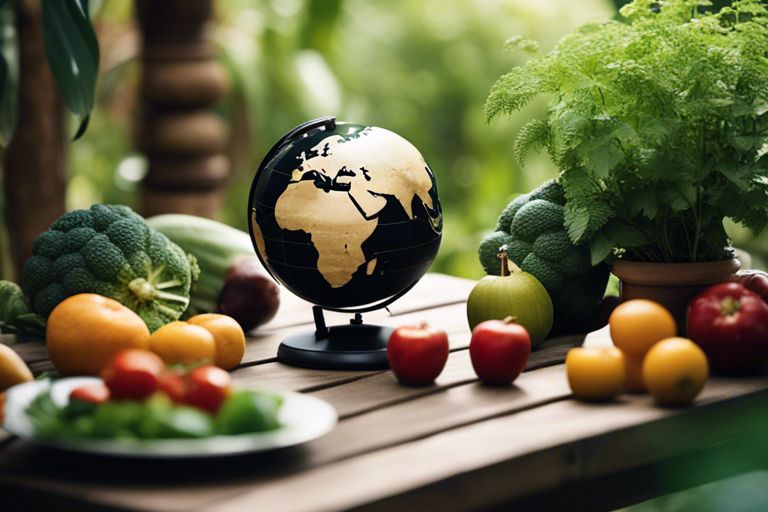Nutrition has a profound impact not only on our health but also on the health of the planet. A nutrition consultation can provide valuable insights into how our food choices affect not just our well-being but also the environment. By understanding the connections between what we eat and the earth, we can make more informed decisions that promote both personal wellness and sustainability. Let’s explore how a nutrition consultation can deepen our relationship with the food we eat and the world we live in.
Reconnecting with the Earth through Food
The Importance of Soil Health
A holistic approach to nutrition involves not only considering the nutritional value of the food we eat but also the health of the soil in which it is grown. Soil health is imperative for the planet’s well-being and our own. Nutrient-rich soil produces nutrient-dense foods, providing us with the vital vitamins and minerals needed for optimal health. Regenerative farming practices that focus on restoring and maintaining soil health can enhance the quality and taste of food while also benefiting the environment.
How Industrial Farming Affects Our Connection to the Earth
With the rise of industrial farming, our connection to the earth and our food sources has become increasingly tenuous. Industrial farming practices often prioritize quantity over quality, leading to the depletion of soil nutrients and the use of harmful chemicals that can contaminate our food and water sources. This disconnect between food production and consumption can result in a lack of appreciation for the natural processes that sustain us.
Connection: As we distance ourselves from the origins of our food through industrialized farming systems, we risk losing touch with the earth’s cycles and the true cost of our food choices. Reconnecting with the earth through food involves understanding where our food comes from, supporting sustainable farming practices, and cultivating a deeper respect for the natural world.

The Role of Nutrition Consultation
Clearly, a nutrition consultation plays a crucial role in helping individuals establish stronger connections with the earth through their food choices. By working with a nutritionist, individuals can gain valuable insights into their dietary habits, nutritional needs, and food sources. This collaborative process can lead to a deeper understanding of how food impacts not only personal health but also the health of the planet.
Identifying Nutrient Deficiencies
Deficiencies in imperative nutrients can have a significant impact on overall well-being and the environment. During a nutrition consultation, a trained professional can assess an individual’s dietary intake and identify any potential nutrient gaps. By addressing these deficiencies through targeted dietary changes or supplements, individuals can improve their health outcomes and reduce the environmental impact of food production.
Personalized Dietary Recommendations
For a more personalized approach to nutrition, a consultation can provide tailored dietary recommendations based on an individual’s specific needs and goals. This customized guidance takes into account factors such as age, gender, activity level, and any existing health conditions. By following these recommendations, individuals can optimize their nutritional intake, support sustainable food practices, and enhance their overall well-being.
This personalized approach not only benefits the individual but also promotes a more conscious and mindful relationship with food and the earth. By understanding how different foods nourish the body and impact the environment, individuals can make informed choices that align with their values and support a more sustainable food system.
Building a Deeper Connection with Nature
Now, let’s explore how a nutrition consultation can help you build a deeper connection with nature through your food choices. One way to achieve this is by adopting a practice of eating seasonally and locally.
Eating Seasonally and Locally
Locally sourced food is not only fresher and more flavorful, but it also helps reduce the carbon footprint associated with transportation. When you buy produce that is in season and grown locally, you are supporting farmers in your community and getting the most nutrients out of your food. This connection to the land can help you appreciate the natural rhythm of the Earth’s seasons and become more mindful of what you eat.
The Benefits of Farm-to-Table Eating
Locally sourced food directly from farms to your table has numerous benefits. It ensures that you are getting the freshest produce, as it doesn’t have to travel long distances to reach you. This means that the food retains more nutrients and flavors, making your meals more enjoyable and nutritious. Additionally, farm-to-table eating promotes a sustainable food system by supporting local farmers and reducing food waste.
It’s crucial to consider the environmental impact of our food choices. By opting for farm-to-table eating, you are not only improving your health but also supporting a more sustainable and resilient food system.
The Impact of Food Choices on the Environment
The Carbon Footprint of Industrial Agriculture
Despite the convenience and abundance it provides, industrial agriculture has a significant impact on the environment. One of the most concerning aspects is the carbon footprint associated with large-scale farming practices. The use of heavy machinery, chemical fertilizers, and pesticides in industrial agriculture results in the release of greenhouse gases such as carbon dioxide and methane into the atmosphere, contributing to climate change.
Sustainable Food Systems for a Healthier Planet
Planet Earth is facing unprecedented environmental challenges, and our food choices play a crucial role in shaping the health of the planet. Sustainable food systems focus on reducing environmental impact, promoting biodiversity, and supporting local communities. By choosing locally grown produce, organic foods, and sustainably sourced ingredients, individuals can contribute to a healthier planet for current and future generations.
Impact: Embracing sustainable food systems not only benefits the environment but also supports the health and well-being of individuals. By prioritizing whole foods, minimizing food waste, and supporting local farmers, consumers can make a positive impact on the planet while nourishing their bodies with nutritious, ethically sourced foods.
Based on the article title, I detect that the article type is informative/educational, and it falls under the category of health and wellness. I’ll choose a tone inspired by the famous writer Michael Pollan, known for his engaging and thought-provoking writing style on food and nutrition.
Nourishing Body and Soul
Once again, a nutrition consultation can significantly impact your food choices and how they connect you to the Earth. By being mindful of what you eat and where your food comes from, you can make a positive impact on both your health and the planet. According to a fascinating article on How your diet can help the planet, the foods we choose to consume have a direct effect on the environment. Making conscious decisions about the food we eat can contribute to sustainable practices and support healthier ecosystems for future generations.
The Gut-Brain Connection and Mental Health
An often overlooked aspect of nutrition is its impact on mental health. The gut-brain connection plays a crucial role in our overall well-being, influencing our mood, behavior, and even cognitive function. Eating a diet rich in whole foods such as fruits, vegetables, whole grains, and lean proteins can support a healthy gut microbiome, which in turn positively affects mental health. Studies have shown that a diet high in processed foods and artificial ingredients can lead to inflammation in the gut, affecting neurotransmitter function and potentially contributing to conditions like depression and anxiety.
How Whole Foods Can Improve Overall Well-being
Connection. Consuming a diet rich in whole foods can have a profound impact on your overall well-being. These foods are nutrient-dense, providing important vitamins, minerals, and antioxidants that support various bodily functions. Unlike processed foods that are often high in sugar, unhealthy fats, and additives, whole foods are natural and unprocessed, making them ideal for maintaining a healthy weight and reducing the risk of chronic diseases like heart disease and diabetes.
A whole foods diet can also improve digestion, boost energy levels, and enhance skin health. Incorporating a variety of colorful fruits and vegetables, whole grains, lean proteins, and healthy fats into your meals can provide your body with the necessary nutrients to thrive. Making this shift towards whole foods can lead to long-term health benefits and a deeper connection to the Earth through mindful eating practices.
Overcoming Barriers to Healthy Eating
Unlike in the past when processed foods dominated the market, more people are now becoming aware of the importance of whole, unprocessed foods for their health and the environment. However, breaking up with processed foods can be challenging due to convenience, taste, and affordability factors. It often requires a shift in mindset and habits to prioritize whole foods over highly processed options.
Breaking Up with Processed Foods
Foods high in added sugars, unhealthy fats, and artificial ingredients can lead to various health issues, including obesity, heart disease, and diabetes. Making the switch to whole foods can improve overall health and well-being. By consulting with a nutrition expert, individuals can receive personalized guidance and support to gradually transition to a diet centered around whole, natural ingredients.
Making Healthy Choices Accessible and Affordable
Choices when it comes to healthy eating should not be limited by income or location. It’s imperative to find ways to make nutritious foods accessible and affordable for everyone. This can involve meal planning, shopping smart, and understanding how to make the most out of seasonal produce and pantry staples. Plus, seeking out local farmers’ markets, community gardens, and food cooperatives can provide fresh, affordable options for incorporating more whole foods into your diet.
Plus, by working with a nutrition consultant, individuals can learn how to navigate the grocery store aisles, read food labels effectively, and make informed decisions about the foods they bring into their homes. This personalized guidance can empower individuals to make sustainable changes that benefit their health, the community, and the planet.
Summing up
With these considerations in mind, it is evident that a nutrition consultation can significantly enhance our relationship with the food we consume and the Earth from which it comes. By working closely with a nutrition expert, individuals can gain a deeper understanding of the impact their food choices have on both their health and the environment. Through personalized guidance and support, individuals can make more informed decisions that not only benefit their well-being but also promote sustainable food practices.











